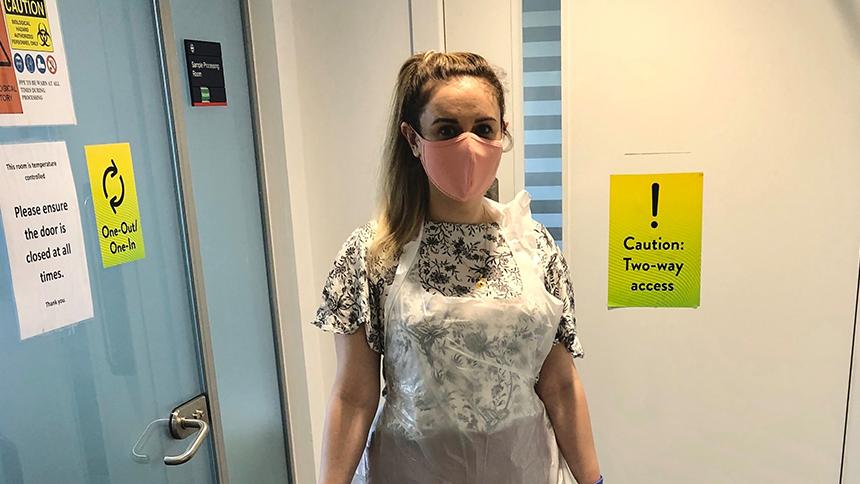
No stone unturned: Pushing ahead with dementia research
Dementia research has been badly affected by the pandemic, but researchers are doing everything they can to keep their vital work going.
As with so much else, coronavirus has had a significant impact on dementia research. Many projects were delayed or put on hold as researchers found themselves locked out of labs or their participants unable to travel to study sites. Some researchers had to drop everything and help the NHS’s response to COVID-19.
Researchers have been adjusting and readjusting to each change, picking up the pieces, restarting experiments and making up for lost time.
However, strict social distancing has meant less time in labs and new daily challenges. The consequences of recently announced lockdowns across the UK remain unclear.
Reopening sites
Before the pandemic, participants in the PREVENT dementia programme visited universities in London, Oxford, Cambridge, Edinburgh and Dublin for memory and thinking tests, brain scans and to give samples.
PREVENT, part-funded by Alzheimer’s Society, is finding out what increases the risk of dementia for people decades before any symptoms start.
The visits were all suspended from mid-March until October, and even then only two of the five sites reopened. Recruitment for the study is likely to be completed nearly a year later than planned.
‘Unfortunately, PREVENT has been significantly impacted by the pandemic,’ says Katie Wells, the programme’s National Research Co-ordinator.
‘During the first lockdown, we were unable to continue with in-person research and there was very little of the assessments that we could complete remotely. Our researchers used this time to analyse data already collected.
‘It was then a slow but thorough process to restart the study visits safely in person.’

Some PREVENT research visits were able to restart with socially distancing measures in place.
The reopened centres have social distancing measures in place, with staff using PPE and participants wearing face masks. During England’s second lockdown, the research was classed as essential and so the study was able to continue.
One participant said, ‘I was proud to volunteer for such a worthy programme and delighted that it was up and running again after the first lockdown. I had every faith that the PREVENT team would have all the necessary precautions in place to keep me safe.’
Professor Craig Ritchie, who leads PREVENT from the University of Edinburgh, remains excited about the programme’s prospects.
‘The energy and determination around PREVENT has never diminished, and we are very well set to generate the knowledge and deliver the impact for improving brain health and dementia prevention,’ he says.
Maintaining compassion
Continuing Compassion in Care is another Society-funded study that has had to adapt. The research is developing a way to measure how people provide or experience compassion when caring for a relative with dementia. It’s also exploring how to help carers manage their emotions during difficult or stressful times.
Initial face-to-face interviews with carers in south-east England were delayed by the pandemic, though they were eventually completed.
A large survey, which will be used to test the new measurement tool, has been severely delayed as it requires approval from an ethics committee that’s currently prioritising COVID-related studies.
To make use of the additional time, Nuriye Kupeli, a Senior Research Fellow at UCL (University College London), has added questions to the survey that relate to carers’ experiences during the pandemic.
‘Although I developed a tool to measure compassion before COVID, I will now be assessing compassion following a pandemic,’ she says.
‘It will provide an insight into how compassion was experienced and how carers managed their emotions during a particularly difficult time.’
Nuriye also used knowledge gained from earlier phases of her study to help colleagues develop a guide to support carers in making difficult decisions during the pandemic.
Urgent funding
The pandemic has also hit dementia research funding. Alzheimer’s Society is currently funding 183 projects with a combined value of £37 million. To protect our investment in them, we couldn’t award any new research grants in 2020.
Earlier this year, we joined forces with Alzheimer’s Research UK and the dementia research community to call on the government to urgently support dementia research.
‘Before the pandemic, dementia researchers were making a discovery a day. Momentum was building and decades of hard work was beginning to pay off,’ says Hannah Churchill, Research Communications Manager at the Society.
‘Without urgent additional funding, the trail of discoveries will go cold and the prospect of a dementia-free future will slip further away. Research is the only way to beat dementia and it must not be an afterthought as we emerge from the pandemic.’
What can you do to help?
You can help get vital research back up and running to improve the lives of people with dementia, now and in the future.


Angela Duffy
saysWhat research is carried out once a patient has been diagnosed with Alzheimer's? My husband started showing signs of early onset dementia at 60 in 2000, he was prescribed Aricept in 2004 and changed to Memantine around 2014, there has been no change since then. Is any research done on whether the illness recedes? Or are they just left to wait to die? My husband is still at home with me, unable to converse but very much aware of his surroundings.
Hello Angela,
Thanks for getting in touch.
There is a lot of research underway to develop new treatments for different types of dementia. These treatments aim to improve care and support people to live well with dementia. If your husband is interested in taking part in research, you might like to contact Join Dementia Research - here's the website: https://www.joindementiaresearch.nihr.ac.uk/
In the meantime, we'd recommend calling our Dementia Connect support line on 0333 150 3456 for dementia information and emotional support. Our advisers are here for you seven days a week: https://www.alzheimers.org.uk/dementia-connect-support-line
You might also benefit from talking with other people affected by dementia within our online community. Talking Point is free to use, and open day or night: https://forum.alzheimers.org.uk/ People with dementia, carers, and others affected by the condition use Talking Point to share their own experiences and talk about situations they are going through.
We hope this is helpful.
Alzheimer's Society blog team